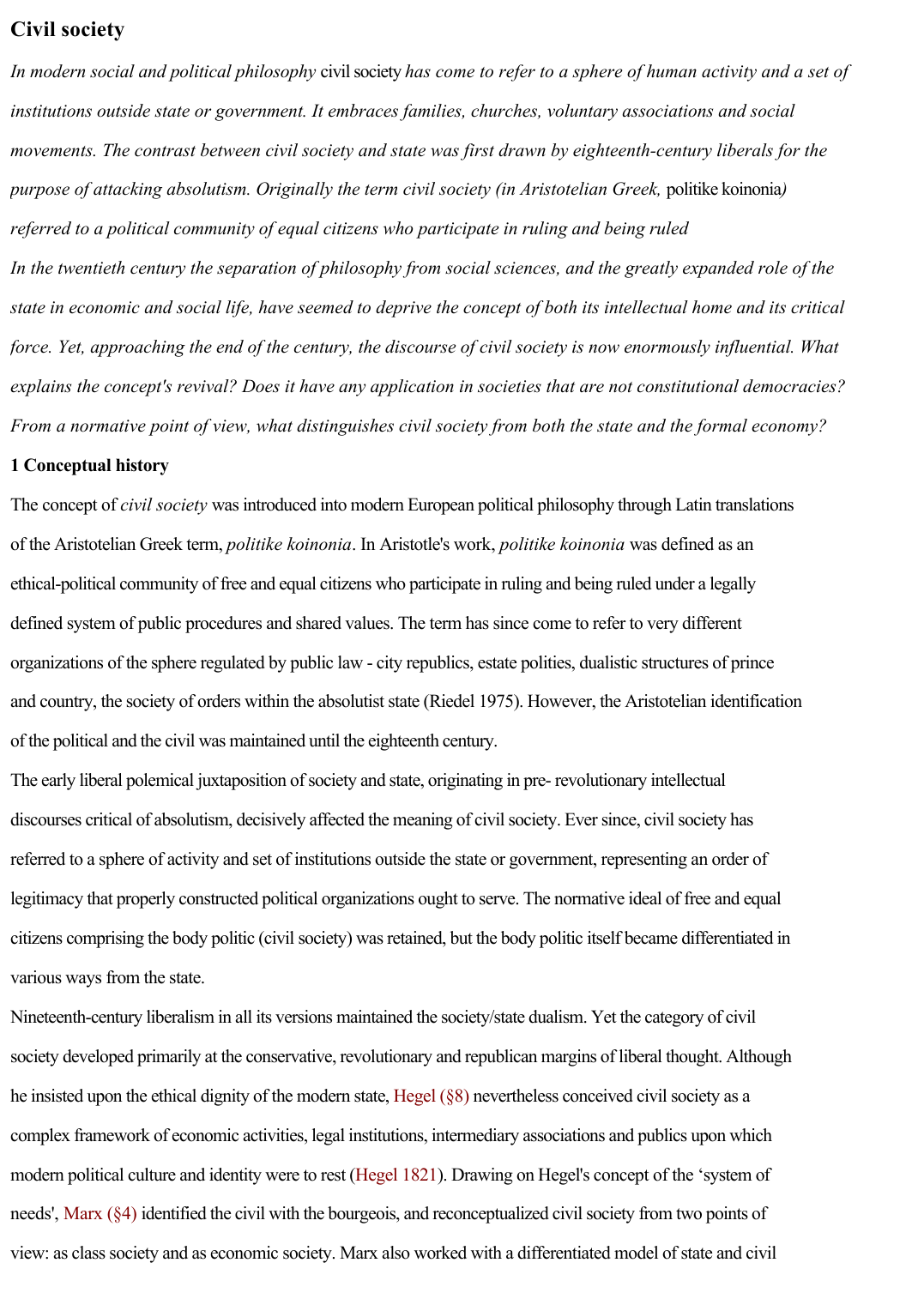Civil society
Publié le 16/05/2020

Extrait du document
«
Civil society
In modern social and political philosophy civil society has come to refer to a sphere of human activity and a set of
institutions outside state or government.
It embraces families, churches, voluntary associations and social
movements.
The contrast between civil society and state was first drawn by eighteenth-century liberals for the
purpose of attacking absolutism.
Originally the term civil society (in Aristotelian Greek, politike koinonia )
referred to a political community of equal citizens who participate in ruling and being ruled
In the twentieth century the separation of philosophy from social sciences, and the greatly expanded role of the
state in economic and social life, have seemed to deprive the concept of both its intellectual home and its critical
force.
Yet, approaching the end of the century, the discourse of civil society is now enormously influential.
What
explains the concept's revival? Does it have any application in societies that are not constitutional democracies?
From a normative point of view, what distinguishes civil society from both the state and the formal economy?
1 Conceptual history
The concept of civil society was introduced into modern European political philosophy through Latin translations
of the Aristotelian Greek term, politike koinonia .
In Aristotle's work, politike koinonia was defined as an
ethical-political community of free and equal citizens who participate in ruling and being ruled under a legally
defined system of public procedures and shared values.
The term has since come to refer to very different
organizations of the sphere regulated by public law - city republics, estate polities, dualistic structures of prince
and country, the society of orders within the absolutist state (Riedel 1975).
However, the Aristotelian identification
of the political and the civil was maintained until the eighteenth century.
The early liberal polemical juxtaposition of society and state, originating in pre- revolutionary intellectual
discourses critical of absolutism, decisively affected the meaning of civil society.
Ever since, civil society has
referred to a sphere of activity and set of institutions outside the state or government, representing an order of
legitimacy that properly constructed political organizations ought to serve.
The normative ideal of free and equal
citizens comprising the body politic (civil society) was retained, but the body politic itself became differentiated in
various ways from the state.
Nineteenth-century liberalism in all its versions maintained the society/state dualism.
Yet the category of civil
society developed primarily at the conservative, revolutionary and republican margins of liberal thought.
Although
he insisted upon the ethical dignity of the modern state, Hegel (§8) nevertheless conceived civil society as a
complex framework of economic activities, legal institutions, intermediary associations and publics upon which
modern political culture and identity were to rest ( Hegel 1821 ).
Drawing on Hegel's concept of the ‘system of
needs' , Marx (§4) identified the civil with the bourgeois, and reconceptualized civil society from two points of
view: as class society and as economic society.
Marx also worked with a differentiated model of state and civil.
»
↓↓↓ APERÇU DU DOCUMENT ↓↓↓
Liens utiles
- Explication de texte : Locke, Second Traité du Gouvernement civil
- Oral AMC : How does social media impact American society ?
- TD 8 civil Cass. 1re civ., 15 avr. 2015, n° 13-27.898
- Civil td: Style et Structure d’une décision judicaire
- Code civil


